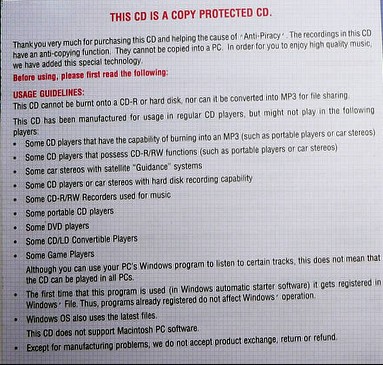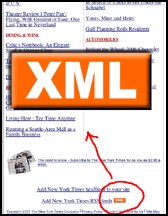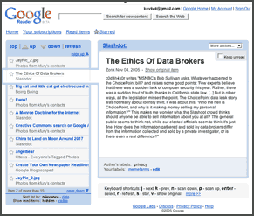A few days ago, the Wall Street Journal published an article entitled
Silent Night For Music Sales, detailing the woes of music stores during the current holiday season and painting yet another bleak picture for the music business. A week prior, I received a similarly worded email from my
distributor, detailing the changes they've seen in the marketplace and what they're building to adapt to what comes in the future. While some labels may have looked at this weather report as a doomsday memo, to me it said a lot of things that I already knew. I appreciate the dose of reality as I now know they're not sticking their head in the sand and praying that the internet just goes away, or thinking they're gonna solve the problem by hopping on some half-assed DRM spyware scheme.
The news is simple- things ain't as great as they used to be. Due to shrinking CD sales, Newbury Comics, one of the staunchest supporters of punk rock and the indie scene, has downsized their music section by almost a third, and shifted their focus to t-shirts, clothing and novelty items. To survive, a good deal of mom and pop stores and small chains are also following that "Hot Topic" model. By utilizing shelf space for black lipstick, Red Sox beanies and fake doo-doo, they can stay in business. One of the most telling items in the WSJ article concerns a huge supporter of Blackout!-
Vintage Vinyl in Fords, NJ. It quotes owner Rob Roth "that being able to simply keep pace with last year's sales puts him among the lucky few. His new motto: "Flat is the new up.""
There are indie labels that are doing well, at least in the mind of the general public. They don't have the huge expectations that the majors do, and can still pump out stuff using a genre-specific marketing machine. The label folks I know see the costs of marketing records, in an oversupplied baby band marketplace to a fickle customer base, going way up. Ultimately, the business becomes a numbers game with the distributor- making sure you ship out enough records to cover the returns from the previous months over shipments and crossing your fingers for one record to become successful and wash away your sins. Without a cash-positive scenario the whole system falters and only the deep-pocketed will survive. Lookout! Records
acrimonious situation with Green Day is a clear example of this.
How did this happen?
MyopiaThe big picture isn't really the strong suit of the big labels and distributors. Most of the executives rose to power during the 80's and 90's- when MTV and commercial radio were making broadcast media stars out of Michael Jackson, hair metal bands and hip-hop,. Furthermore, major companies were still earning artificially-enhanced revenue from fans repurchasing their catalogs of LP's on the industry-engineered (and sonically inferior) CD format. Those who did warn of the oncoming danger of digital downloads in the mid-90's were laughed at, dismissed as crazy, or fired for their transgressions against the grain.
LuddismInstead of embracing technology like the porn biz did, the music industry was the last to the digital table and continue to use Flintstones techniques in a Jestsons world. Christ on a bike, Billboard is just getting around to giving Myspace some ink as an "emerging" marketing tool. Ask virtually any record label person about Creative Commons, and they cock their heads to the side and raise their eyebrows like a dog given a command it doesn't understand. The major publishers should be all over that type of system, but they aren’t.
NarcissismIt's not about music, it's about THEM. The bleach toothed, fake tanned, fairest of them all at the top of the music food chain are too busy doing self-congratulatory power lunches and chasing aspiring starlets around their desks to think about the survival of their business. They've made their money on IPO's, all have golden parachutes, and they're milking it for all it's worth until the day it collapses in an Enron style crash/burn.
HubrisThe labels were always ahead of the game, owning and controlling the method of distribution. They figured that they count on their attorneys and the government to save them against a rebellion by the masses. The industry swaggering like the Captain of the Titanic But the recent numbers show that the public (and even some European nations) still embrace and (perhaps even
legalizing) P2P. It took Steve Jobs to partially wake them all up and realize that digital format could not be marginalized.
Next?The next three or so years are going to shake out labels and distribution companies- a great many labels will go the way of Lookout! The
Victory and
Saddle Creeks of the world will most likely continue to survive and thrive, having built a huge following and fan base and who can adapt more quickly to changes in the marketplace. But the economy of developing new bands will almost entirely rest in the digital realm as digital networks start to allow the more successful artists to monetize their art.
Looking forward, there will also be a marked difference in how the generations consume their music. Older users (meaning those over 34) will still primarily buy hard copies, out of loyalty to the packaging and the assumption better sound quality. Smaller, growing bands would be released exclusively in a digital format far ahead of (or in lieu of) a CD release. While a band with a large portion of older listeners like Bon Jovi, still would still find a large number of takers in the plastic disc format.
It’s starting to happen now....
Nitro recently released EP from Blackout! alumni
Crime In Stereo in a strictly digital format as a way to nurture the digital marketplace and quickly release some great tunes. Blackout! will be releasing some unreleased material from
The Banner in the same way in early '06. Warner does get an honorable mention with their
Cordless label... but in order to be successful, they're going to have to promote those releases with at least the same gusto that an indie would. I fear this is going to go the same way of the fake independent labels they all tried to build in the 90's as a way to establish credibility for their artists, instead of looking at this as the true future of music.
Want proof of the age gap? Take a look at this, the statistics of users of the
last.fm service I gushed about in a previous post. (I hope they don't mind me posting their publicly available info here.)

It shows the HUGE gap in the age bracket that is adopting their service. It also shows that among the youngest users, the disproportionate amount of males present evens out- so all music buyers will eventually get the bulk of their music digitally.
The Role Of The Record Company In The Digital EraHypebot has posted this brilliant
manifesto for change in the music business.
To me, Number 7 on their list is the most salient point:
" Stop thinking that every act has to go platinum and start creating a profitable business around artists who consistently sell 50,000 - 250,000 CD's. Fragmented media is already leading to fewer superstars and a lot more mid-level artists. But when the artist's "output" resides on a hard drive rather than gathering expensive dust on store shelves or in warehouses; can't smaller but longer term sales numbers be profitable? "
So with all this talk of digital democratization of music, do we still need labels? Yep. This is based on three basic support systems required by artists to develop:
tastemaking,
funding &
administration.
Roadrunner, Relapse, Saddle Creek, Merge are all
tastemakers- their imprint is better than the UL and Better Housekeeping seals to large numbers of people who trust them to find the best talent out there. I don't think the majors will fare as well accomplishing the same mission as their system is meant to capitalize on popular music, as opposed to niche bands. But tastemaking is a very qualitative function. (More about this in a future post.)
What CAN be measured more tangibly is
money- the one thing that most bands don't have, and what they need to grow. Artists and bands don't usually have the wherewithal to fund higher-end produced recordings, shoot videos, buy a van, and advertise in all the media they need to in order to reach the masses.
The other real quantitative item is business acumen, contacts and experience. Accountants, publicists salespeople, and product managers do labor-intensive jobs that most artists don't want to do, or simply can't handle. A bands first priority is to be out there- shaking babies, kissing hands, playing shows and writing songs, not the day-to-day drudgery of making the commerce engine work.
Put on your helmets.
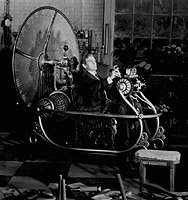 After reading the Hypebot year-end post, I time-warped over to the Hits Magazine summary of the past events (warning: registration required) to see if anything was of interest to me here in the minor leagues. Aside from all the kudos to the executives and recapping of various hirings and firings, one paragraph really stuck out:
After reading the Hypebot year-end post, I time-warped over to the Hits Magazine summary of the past events (warning: registration required) to see if anything was of interest to me here in the minor leagues. Aside from all the kudos to the executives and recapping of various hirings and firings, one paragraph really stuck out: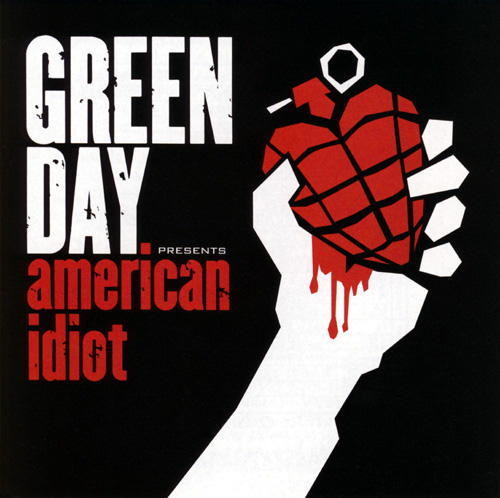 Further down the post, they start talking about certain success stories. I noticed that American Idiot has sold about 3.3 million copies to date in the US. From perspective as a consumer, this has been the most well-received GD album since Dookie, and actually probably more so. The band is headlining stadiums for chrissakes!
Further down the post, they start talking about certain success stories. I noticed that American Idiot has sold about 3.3 million copies to date in the US. From perspective as a consumer, this has been the most well-received GD album since Dookie, and actually probably more so. The band is headlining stadiums for chrissakes!